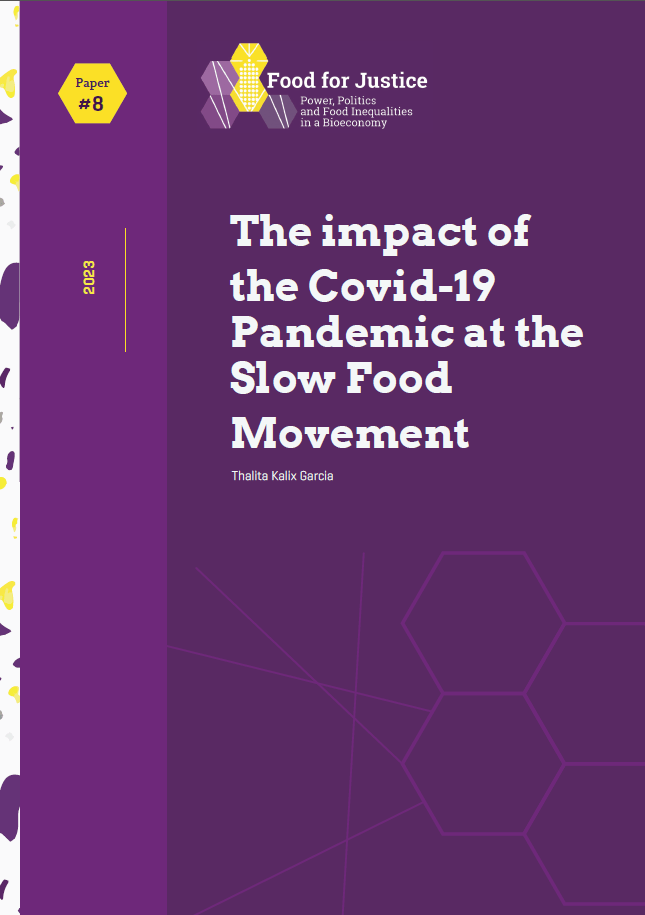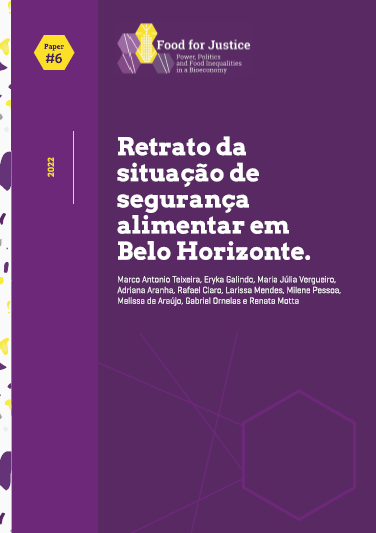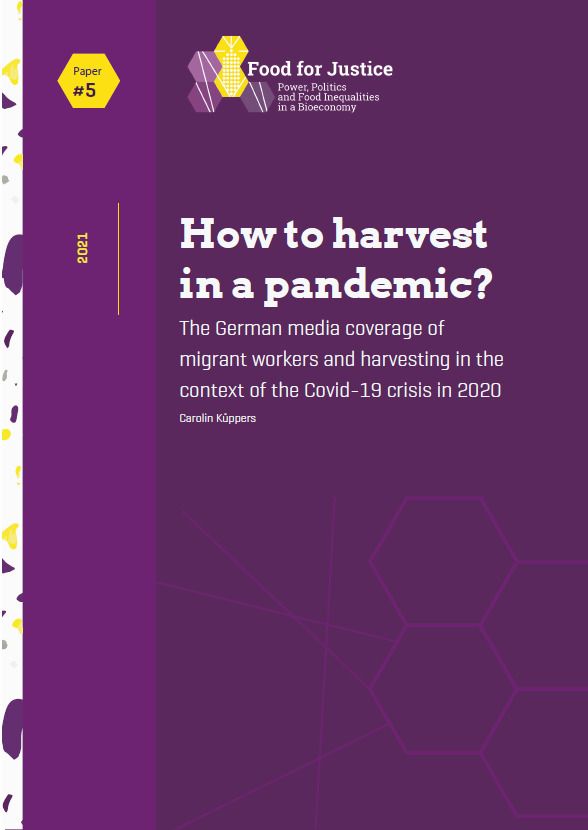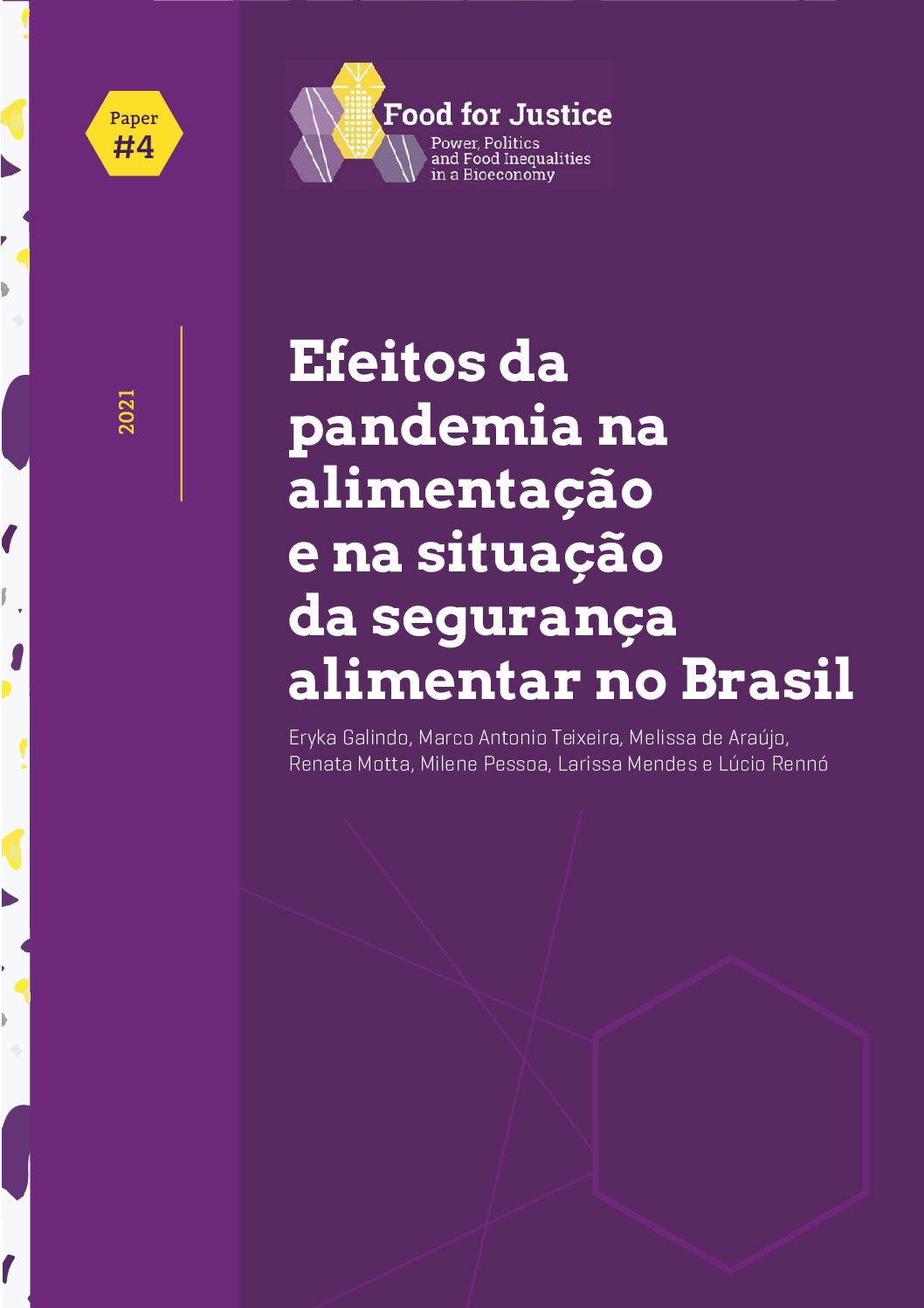Working Paper 9 • 2024
Políticas de Segurança Alimentar e Nutricional nos Municípios Brasileiros
Abstract
This publication records the central ideas that emerged from the self-organized activity “Food and nutrition security policy at municipal level: context and opportunities”, held virtually at the 5th National Research Meeting on Food and Nutrition Sovereignty and Security (V ENPSSAN, 2022). Guaranteeing the Human Right to Adequate Food and the scope of public policies on Food and Nutrition Security (FNS) necessarily involve recognizing the central role of municipalities in implementing actions and building local dialogues, in an integrated manner with other public authorities and government areas, as proposed by the National FNS System. In the debate, reflections emerged on monitoring population food security/insecurity, definitions and concepts associated with public FNS policies, reports of municipal experiences, as well as opportunities for resuming and strengthening FNS policies in municipalities. The debate gave rise to reflections on monitoring population food security/insecurity, definitions and concepts associated with public FNS policies, reports of municipal experiences, as well as highlighting opportunities for resuming and strengthening FNS policies in municipalities. Eight potential approaches were identified to contribute to the field of research on FNS public policies in the municipal context: participatory governance; territorial diversity and the rural-urban relationship; institutionalization; civil society action; intersectionality; scales and different spatialities; interface with the socio-ecological agenda; and state capacities. Finally, it also identified issues and challenges for the effectiveness of municipal FNS policies. This document brings collective contributions to the different windows of opportunity currently facing the various social actors involved in municipal FNS policies. In this regard, we highlight the resumption of the public agenda guided and strengthened by the federal government (from 2023), the resumption of the national CONSEA, and the occurrence of municipal elections in 2024.
Working Paper 8 • 2023
The impact of the Covid-19 Pandemic at the Slow Food Movement
Abstract
Der Ausbruch des Coronavirus wurde im März 2020 zu einer globalen Pandemie erklärt, was viele Länder dazu veranlasste, sich abzuschotten, um die Krankheit einzudämmen und die Belastung der nationalen Gesundheitssysteme zu vermeiden oder zu verringern. In dem Maße, wie Arbeit und Studium ins Internet verlagert wurden und die soziale Distanzierung zu einer Sicherheitsregel wurde, mussten sich auch die sozialen Bewegungen anpassen. Darüber hinaus haben die Lebensmittelbewegungen an Bedeutung gewonnen, da eines der ersten Anliegen darin bestand, die Lebensmittelproduktion und -verteilung auf der ganzen Welt trotz der Abschaltungen aufrechtzuerhalten. In diesem Artikel werden die Auswirkungen der Covid-19-Pandemie auf die Slow-Food-Bewegung analysiert und untersucht, wie sie die Organisation, die Agenda und die Aktionen der Bewegung verändert hat. Er stützt sich auf empirische Untersuchungen in zwei Ländern: Brasilien und Deutschland, und analysiert drei Phasen der Pandemie, von den ersten Auswirkungen im Jahr 2020 bis zu den Anpassungen und Kontinuitäten in den Jahren 2021 und 2022. Diese Arbeit basiert auf persönlicher und virtueller Ethnografie und ist Teil einer umfassenderen Untersuchung der Bewegung in beiden Ländern.
Working Paper 7 • 2023
Food and urban politics in Belo Horizonte: agroecology, activist coalitions, and bottom-up technologies of sustainable urbanization
Abstract
Ziel dieses Arbeitspapiers ist es, einen Beitrag zur entstehenden Debatte zwischen Stadt- und Ernährungswissenschaften zu leisten, indem die soziopolitische Dimension des Ernährungssystems und seines städtischen Kontexts in den Vordergrund gerückt wird. Geleitet von den allgemeinen Forschungsfragen des Projekts „Food for Justice: Power, Politics and Food Inequalities in a Bioeconomy“, ist diese Untersuchung Teil einer Fallstudie zur Lebensmittelpolitik in der Stadt Belo Horizonte. Sie befasst sich mit den sozialen Innovationen der agrarökologischen und der Wohnungsbau-Bewegung der Stadt sowie mit den Bewohnern von Izidora, den Bewohnern der so genannten „informellen Siedlung“, deren Engagement im Kampf um Wohnraum und das Recht auf Stadt zu bemerkenswerten Erfolgen bei der Bildung von Aktivistenkoalitionen und der Neugestaltung städtischer Randgebiete geführt hat. Auf der Grundlage der digitalen ethnografischen Feldforschung, die ich zwischen Januar und Dezember 2020 durchgeführt habe, analysiere ich den Kontext, die Nutzung und die Reichweite dieser sozialen Innovationen als Instrument zur Veränderung der Stadtentwicklung in den Randgebieten von Belo Horizonte.
Working Paper 6 • 2022
Retrato da Segurança Alimentar e Nutricional em Belo Horizonte: Portrait of food and nutrition security in Belo Horizonte
Abstract
This publication analyses the food insecurity situation in the city of Belo Horizonte, the capital of the Brazilian state Minas Gerais. Belo Horizonte is publicly recognized for its history of implementing public policies on food security. The data analyzed was collected through a public opinion survey representative of the population of Belo Horizonte, with data collection carried out in areas with high pedestrian flow distributed in 113 neighborhoods from 7 to 27 April 2022. The Research Group Food for Justice: Power, Politics and Food Inequalities in the Bioeconomy, based at the Freie Universität Berlin (Germany), coordinated this data collection in cooperation with researchers from the Universidade Federal de Minas Gerais (UFMG), the Forum of Researchers on Food Sovereignty and Food Security of Belo Horizonte and the Undersecretariat of Food Security and Nutrition of the Mayor of Belo Horizonte, Fome Zero Institute (IFZ) and Center for the Study of Metropolis of the Universidade de São Paulo (CEM/USP). The results show that 55.7% of households experienced food insecurity, whether mild (30.1%), moderate (12.4%), or severe (13.2%). The findings also point out that some domiciles were more exposed to food insecurity than others, according to household features. For example, food insecurity was significantly higher in households headed by a single female person (63.3%), headed by someone who was racialized as brown (57.3%) or black (68.4%), or when the household had in its composition children up to 4 years old (66.9%) or children and teenagers from 5 to 17 years old (64.7%). The frequency of food insecurity is also significant in households whose per capita income is equivalent to up to 25% of the minimum wage (R$303.00, three hundred and three reais) (86.9%). It is possible to conclude that food insecurity is reproduced from the interweaving of inequalities, which requires a broad set of actions to overcome such asymmetries. It includes a state action that articulates different levels and spheres of power, with popular participation, and an intersectoral approach, which integrates and ensures rights and policies to the most vulnerable population.
Working Paper 5 • 2021
How to harvest in a pandemic? The German media coverage of migrant workers and harvesting in the context of the Covid-19 crisis in 2020
Abstract
Die COVID-19-Pandemie ist weithin als eine Krise diskutiert worden, die sich auf das tägliche Leben auf globaler Ebene auswirkt, einschließlich der Lebensmittelsicherheit, der globalen Lieferketten, des Verbraucherverhaltens und der Ernährung. In dieser Krise wurde die Bereitstellung von Lebensmitteln zu einer noch wichtigeren Dienstleistung, die landwirtschaftliche Arbeit zu einer wichtigen Tätigkeit und damit die Landarbeiter zu sogenannten wichtigen Arbeitskräften. In Deutschland wurde dieses Thema von den lokalen und überregionalen Zeitungen breit aufgegriffen. Durch das große Medieninteresse während der ersten Aussperrung wurden die Arbeitsbedingungen in der Lebensmittelbranche und insbesondere die Marginalisierung der Landarbeiter für eine breitere Öffentlichkeit sichtbar gemacht. In diesem Beitrag werden die Diskurse und die Auswirkungen der Lebensmittelproduktion in Zeiten der Pandemie auf die bereits bestehenden Ungleichheiten zwischen den Arbeitnehmern und die fehlenden Arbeitnehmerrechte analysiert, wobei Wanderarbeiter als eine der am stärksten gefährdeten Gruppen im deutschen Lebensmittelsystem herausgestellt werden. Abschließend wird gezeigt, dass die Mechanismen von Covid-19, die während der Pandemie bestehende Ungleichheiten im Lebensmittelsektor verschärft haben, Teil einer strukturellen sozioökonomischen und soziopolitischen Krise sind, die im Kontext des globalen Kapitalismus und intersektionaler Ungleichheiten betrachtet werden muss.
Working Paper 4 • 2021
Efeitos da pandemia na alimentação e na situação da segurança alimentar no Brasil
Abstract
This working paper analyzes the effects of the Covid-19 pandemic on food security and food consumption in Brazil. The data was collected between November and December 2020 through a public opinion survey conducted by telephone with a representative sample of the Brazilian population. This data collection was coordinated by the Research Group Food for Justice: Power, Politics and Food Inequalities in a Bioeconomy, of the Freie Universität Berlin (Germany), jointly with researchers from the Universidade Federal de Minas Gerais (UFMG) and the Universidade de Brasília (UnB). The results show that 59% of the inquired households are in a situation of food insecurity during the pandemic, and that a significant part of the respondents reduced the consumption of food items important for their regular diets; 44% reduced meat and 41% reduced fruit consumption. Thus, the data collected confirms the previous findings by the National Research for Sample of Domicile (Pesquisa Nacional por Amostra de Domicílio) that indicated an increase in food insecurity in Brazil in the years 2017 and 2018 compared to the previous standards from 2013. In conclusion, the socioeconomic instabilities caused by the political and economic crises in recent years have worsened with the Covid-19 pandemic, reinforcing food inequalities for a large portion of the Brazilian population, especially regarding access to healthy food on a regular basis in a sufficient quantity and quality.










